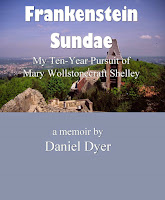While she
was writing The Fortunes of Perkin Warbeck
(1827–30), Mary was undergoing some trying personal events. For one,
Bysshe’s long-time friend Thomas Jefferson Hogg (he was not named for the
American president) had, in the early months of 1827, begun living with Mary’s
best friend, Jane Williams (who, as you recall, was the widow of Edward, who’d
drowned with Bysshe back in the summer of 1822).
Mary was not
thrilled. When she and Bysshe had first hooked up, Hogg, animated by what he
perceived as the “open marriage” aspect of it all, had begun sniffing around
the Shelley household, believing Bysshe would not disapprove of his carnal
interests in Mary. Nothing happened (apparently), but if you need additional
evidence of Mary’s imagination, consider her ability to avoid Hogg’s rutting
notions. Oh, and recall, as well, that Hogg had been expelled from Oxford along
with Bysshe because of their pamphlet, discussed much earlier here, On the Necessity of Atheism (1811). Hogg
would later write a biography of Bysshe—Life
of Percy Bysshe Shelley, published in 1858, seven years after Mary’s death.
Wildly inaccurate—but useful for some personal details.
Okay. So …
T. J. Hogg, a man whom Mary disdained, had swooped in to live with her best
friend. That would have a deleterious
and frigid effect on her friendship. Little did she know. In July 1827, Mary
learned from another friend that Jane Williams Hogg (never her legal
surname—they were not married) had been speaking ill of her behind her back,
blaming her dark moods back in the fatal summer of 1822 for sending Bysshe (and
thus Edward) out to sea more and more often—just to get away from her gloom. In
other words, Jane was in a way blaming Mary for the drownings.
In her
journal, Mary cried out, My friend has
proved false & treacherous! Miserable discovery—for four years I was
devoted to her—& I earned only ingratitude. She went on to talk about the deep—bleeding, hidden wound of my lost
heart—… such a tale of horror and despair.[1]
And, as
always, she knew what she had to do about it: Writing—study—quiet—such remedies I must seek—woe the while—I thought
fresh hopes were to be mine—but who can sustain the mortal sadness which such a
discovery must produce.[2]


No comments:
Post a Comment